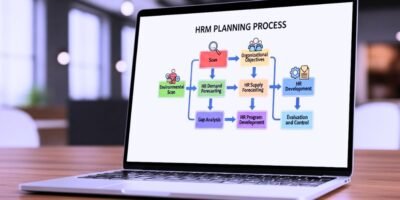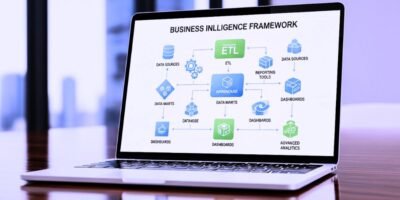In today’s fast-paced and data-driven business landscape, small businesses face the challenge of making informed decisions based on the vast amount of information available. It is where business intelligence software comes into play, revolutionizing data analytics and empowering small businesses to extract valuable insights from their data. This article will explore the concept of BI software, its significance for small businesses, key features and benefits, and its impact on data-driven decision-making.
Understanding Business Intelligence Software
Business intelligence (BI) software is tools and technologies designed to collect, analyze, and present business data meaningfully and effectively. It enables small businesses to transform raw data into valuable insights, providing a comprehensive view of their operations, performance, and market trends. It utilizes various data mining, reporting, querying, and visualization techniques to help businesses better understand their data.
The Significance for Small Businesses
In the era of big data, small businesses often need help managing and leveraging the vast amounts of information they generate effectively. This is where business intelligence software becomes invaluable. Here are some key reasons why it is significant for small businesses.
Data-Driven Decision-Making
The software solutions enable small businesses to make informed decisions based on accurate and up-to-date data. It provides real-time insights into various aspects of the company, such as sales trends, customer behavior, inventory levels, and financial performance. With these insights, small businesses can identify opportunities, address challenges, and optimize their operations.
Competitive Advantage
Small businesses can gain a competitive edge in their industry by harnessing the power of business intelligence software. It allows them to identify market trends, track competitor activities, and understand customer preferences. This information enables small businesses to tailor their strategies, improve their products or services, and deliver a superior customer experience.
Improved Efficiency and Productivity
The software streamlines data analysis processes, eliminating the need for manual data crunching and spreadsheet manipulation. It saves valuable time and resources, allowing small businesses to focus on core activities and strategic initiatives. Moreover, automation features within the software facilitate report generation, data visualization, and predictive analytics, enabling small businesses to work more efficiently and make data-driven decisions faster.
Key Features and Benefits
Business intelligence software offers a range of features and benefits specifically tailored for small businesses. Let’s explore some of the key ones.
Data Integration and Centralization
The software solutions enable small businesses to integrate data from various sources, such as customer relationship management (CRM) systems, sales databases, and financial software. This centralized data repository provides a holistic view of the business, eliminating data silos and ensuring data accuracy and consistency.
Data Visualization and Reporting
Business intelligence software offers intuitive dashboards and visualizations that transform complex data into easy-to-understand charts, graphs, and reports. These visual representations allow small business owners and stakeholders to grasp trends, patterns, and insights quickly, facilitating faster and more effective decision-making.
Ad Hoc Querying and Self-Service Analytics
The intelligence tools empower small businesses to explore data and generate custom reports without relying on IT or data analysts. It provides self-service analytics capabilities, allowing users to perform ad hoc queries, slice and dice data, and create personalized reports tailored to their needs.
Predictive Analytics and Forecasting: Advanced business intelligence software leverages predictive analytics algorithms to forecast future trends and outcomes. It enables small businesses to anticipate market demands, optimize inventory levels, and identify potential risks or opportunities. By leveraging predictive analytics, small businesses can make proactive decisions and stay ahead of the competition.
Impact on Data-Driven Decision-Making
The adoption of business intelligence software has a profound impact on data-driven decision-making within small businesses. Here are some ways it revolutionizes the decision-making process.
Real-Time Insights
Business intelligence solutions provide real-time access to business data, enabling small business owners to monitor key performance indicators (KPIs) and metrics as they happen. This real-time visibility allows agile decision-making, quick course corrections, and timely responses to market changes or customer needs.
Improved Accuracy and Reliability
With business intelligence software, small businesses can rely on accurate and reliable data for decision-making. They can trust the insights derived from their software solutions by eliminating manual data entry errors and ensuring data consistency across different systems, leading to more confident and accurate decision-making.
Data-Backed Strategies
The software solutions empower small businesses to formulate strategies based on solid data evidence rather than gut feelings or intuition. By analyzing historical data, market trends, and customer behavior, small companies can identify growth opportunities, optimize pricing strategies, and allocate resources effectively.
Scenario Analysis and What-If Simulations
Business intelligence software allows small businesses to conduct scenario analysis and what-if simulations to assess the potential impact of different strategies or decisions. By exploring various scenarios and their outcomes, small companies can make informed choices, mitigate risks, and identify the best course of action.
Conclusion
Business intelligence software has become a game-changer for small businesses, enabling them to unlock the full potential of their data. By providing powerful data analytics capabilities, intuitive visualizations, and real-time insights, it empowers small businesses to make data-driven decisions, gain a competitive advantage, and achieve sustainable growth. Embracing it is no longer a luxury for small businesses—it is necessary for today’s data-driven business landscape.













